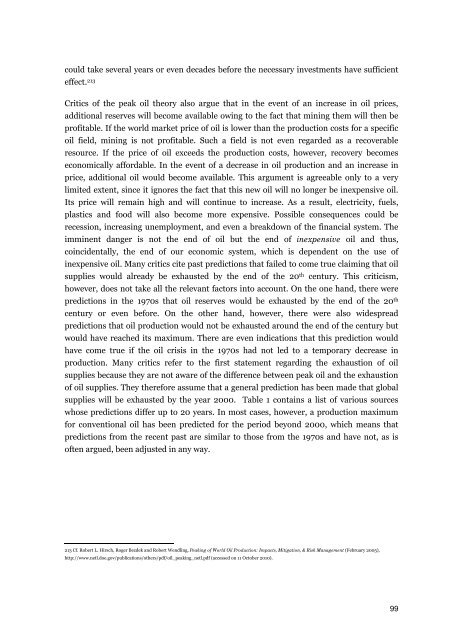PEAK OIL
PEAK OIL
PEAK OIL
Create successful ePaper yourself
Turn your PDF publications into a flip-book with our unique Google optimized e-Paper software.
could take several years or even decades before the necessary investments have sufficient<br />
effect. 213<br />
Critics of the peak oil theory also argue that in the event of an increase in oil prices,<br />
additional reserves will become available owing to the fact that mining them will then be<br />
profitable. If the world market price of oil is lower than the production costs for a specific<br />
oil field, mining is not profitable. Such a field is not even regarded as a recoverable<br />
resource. If the price of oil exceeds the production costs, however, recovery becomes<br />
economically affordable. In the event of a decrease in oil production and an increase in<br />
price, additional oil would become available. This argument is agreeable only to a very<br />
limited extent, since it ignores the fact that this new oil will no longer be inexpensive oil.<br />
Its price will remain high and will continue to increase. As a result, electricity, fuels,<br />
plastics and food will also become more expensive. Possible consequences could be<br />
recession, increasing unemployment, and even a breakdown of the financial system. The<br />
imminent danger is not the end of oil but the end of inexpensive oil and thus,<br />
coincidentally, the end of our economic system, which is dependent on the use of<br />
inexpensive oil. Many critics cite past predictions that failed to come true claiming that oil<br />
supplies would already be exhausted by the end of the 20th century. This criticism,<br />
however, does not take all the relevant factors into account. On the one hand, there were<br />
predictions in the 1970s that oil reserves would be exhausted by the end of the 20th century or even before. On the other hand, however, there were also widespread<br />
predictions that oil production would not be exhausted around the end of the century but<br />
would have reached its maximum. There are even indications that this prediction would<br />
have come true if the oil crisis in the 1970s had not led to a temporary decrease in<br />
production. Many critics refer to the first statement regarding the exhaustion of oil<br />
supplies because they are not aware of the difference between peak oil and the exhaustion<br />
of oil supplies. They therefore assume that a general prediction has been made that global<br />
supplies will be exhausted by the year 2000. Table 1 contains a list of various sources<br />
whose predictions differ up to 20 years. In most cases, however, a production maximum<br />
for conventional oil has been predicted for the period beyond 2000, which means that<br />
predictions from the recent past are similar to those from the 1970s and have not, as is<br />
often argued, been adjusted in any way.<br />
213 Cf. Robert L. Hirsch, Roger Bezdek and Robert Wendling, Peaking of World Oil Production: Impacts, Mitigation, & Risk Management (February 2005),<br />
http://www.netl.doe.gov/publications/others/pdf/oil_peaking_netl.pdf (accessed on 11 October 2010).<br />
99


